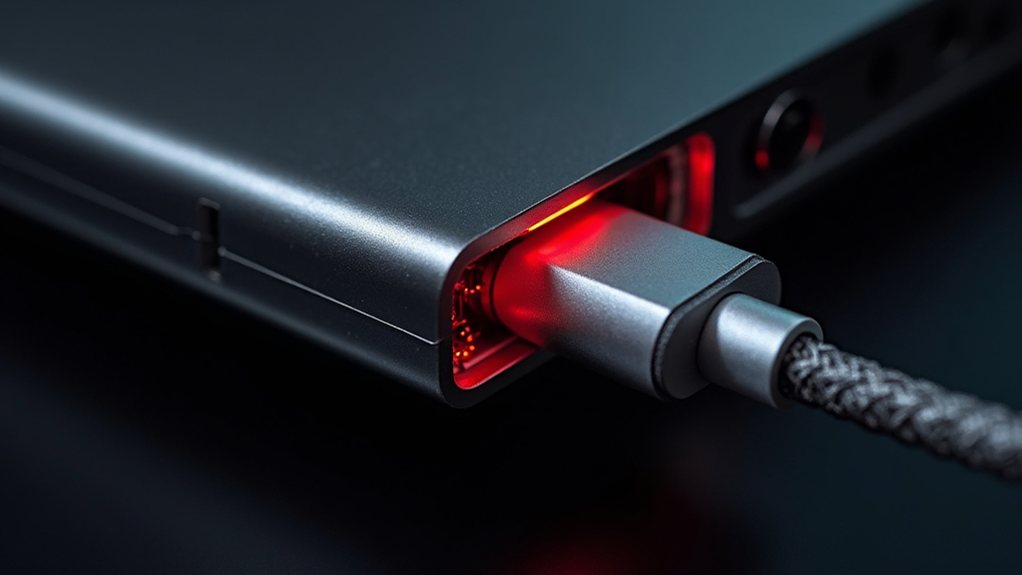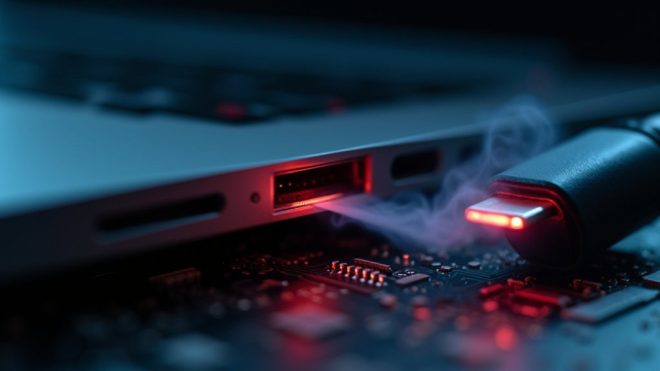A significant flaw in Windows 11’s USB Type-C notification system has manufacturers rushing to fix missing alerts for charging and connectivity issues. The gap leaves users without essential warnings about slow charging, unstable connections, and potential hardware damage. Microsoft’s response includes enforcing stricter USB-C standards through its Hardware Lab Kit, as OEMs scramble to update firmware and drivers. This notification shortfall, likened to a house with faulty wiring, reveals deeper challenges in modern device connectivity.

A significant gap in Windows 11‘s USB Type-C notification system has emerged as manufacturers continue shipping devices with improperly configured ports, leaving users without critical alerts about charging issues and potential hardware damage.
This notification shortfall stems from OEMs failing to properly implement Microsoft‘s USB-C standards, particularly in port labelling and firmware integration. Think of it as building a house with electrical outlets that look modern but lack proper wiring behind the walls – they’re there, but not quite doing their job.
Modern USB-C ports mask an unseen crisis of improper implementation, like beautiful light switches connected to faulty wiring.
Microsoft’s Windows Hardware Compatibility Program mandates that OEMs configure USB-C ports to trigger notifications for scenarios like slow charging, connection instability, and excessive power draw. Nevertheless, many manufacturers have taken shortcuts, mislabelling ports internally as Type-A or omitting vital ACPI descriptors that facilitate these significant alerts. Users may now receive toast notifications during charging problems thanks to Windows 11 version 24H2’s improved error reporting system.
The consequences of these oversights ripple through the user experience like a digital game of telephone gone wrong. When a phone charges at a snail’s pace or a monitor connection becomes unstable, Windows 11 remains eerily silent instead of alerting users to potential issues. This silence isn’t just inconvenient – it’s potentially dangerous for hardware integrity and data security. IT teams are experiencing a surge in support burdens due to the extensive manual troubleshooting required.
To address this growing concern, Microsoft has intensified its enforcement of USB-C standards through the Windows Hardware Lab Kit. OEMs must now navigate a gauntlet of tests covering everything from underpowered adapter detection to wet port identification. It’s a digital obstacle course designed to guarantee every USB-C port plays by the rules.
The stakes are particularly high as USB-C becomes the de facto standard for device connectivity and charging. Silent failures in these connections can lead to prolonged troubleshooting sessions, damaged components, and frustrated users wondering why their expensive new laptop isn’t playing nicely with their peripherals.
Microsoft’s push for compliance has sent OEMs scrambling to update firmware and drivers, with some manufacturers quietly pushing out updates to address these notification gaps. It’s a behind-the-scenes race to meet standards that should have been implemented from the start.
The impact extends beyond mere inconvenience. Without proper notifications, users might continue using damaged cables or incompatible chargers, potentially leading to long-term device damage or reduced battery life. It’s like driving a car with a broken check engine light – you won’t know there’s a problem until it’s too late.
For the Windows ecosystem to maintain its reputation for reliability, this notification gap needs closing – and fast. As USB-C continues its march toward ubiquity, proper implementation of these alerts isn’t just a nice-to-have feature; it’s a fundamental safety net for the increasingly complex world of modern device connectivity.
Final Thoughts
Microsoft’s oversight regarding USB Type-C notifications in Windows 11 has prompted manufacturers to urgently develop fixes, illustrating the challenges associated with standardizing USB-C connectivity. As OEMs work to address this issue, it highlights that even established platforms can encounter difficulties with evolving hardware standards. Users can anticipate updates soon to restore full USB-C functionality.
The Emotional Computer team is here to assist manufacturers navigating these challenges. If you’re in need of support or solutions related to USB-C functionality, we invite you to reach out to us. Click on our contact us page to get in touch!

